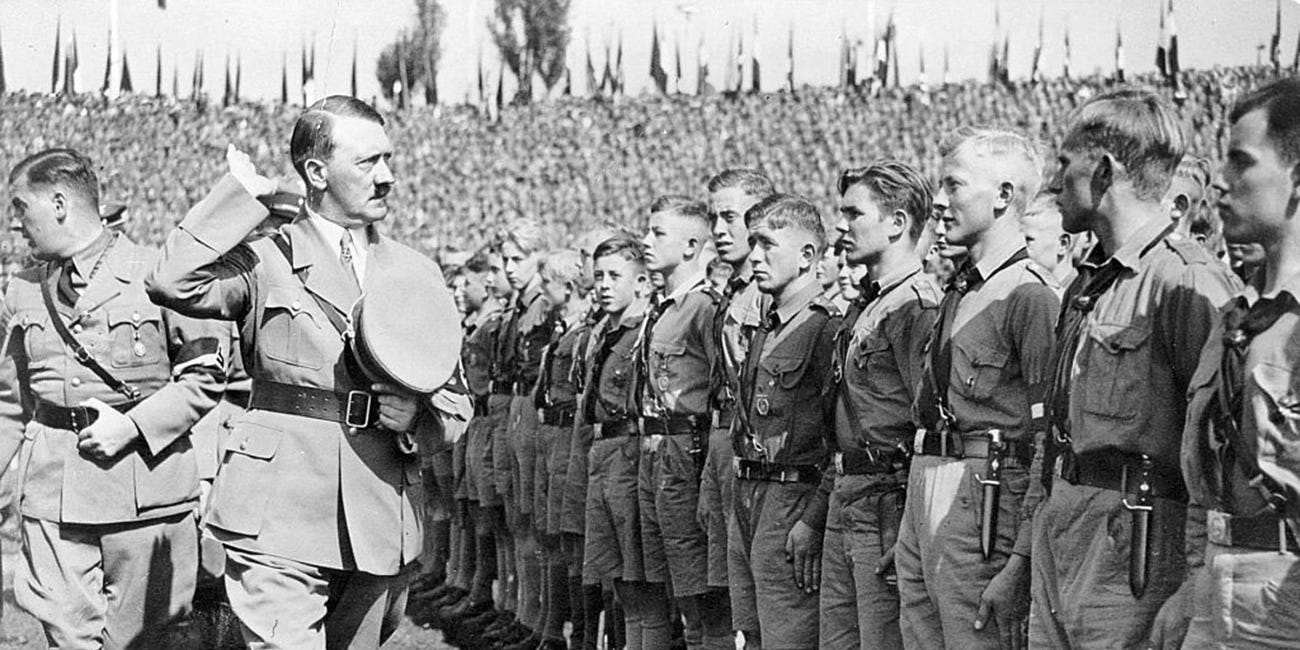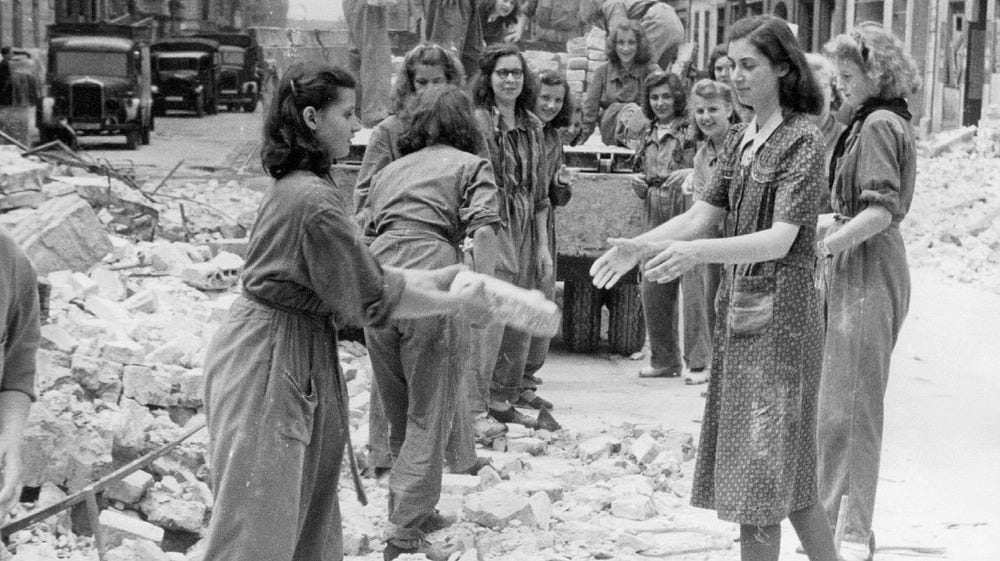Massive work of scholarship, by an eye witness
Review of The Rise and Fall of the Third Reich: A History of Nazi Germany by William Shirer
This huge book sets the standard for all subsequent histories of one of the darkest chapters of the 20thcentury. It is brilliant and will survive as a classic of the genre of first-rate history as written by a reporter who was there.
The first 1/4 of the book is about the rise of Hitler. He was a bum and dreamer in Austria, had a galvanizing experience as a corporal in World War I, and linked himself to bizarre and parochial right-wing nationalist groups in the 1920s. These were terrible years of crisis in greater Germany, the Weimar Republic. Shirer brilliantly delineates the stages of this, as Hitler stepped to the stage of an obscure Bavarian group of about 30 nationalist fanatics, to become the undisputed leader of Germany by 1933. This was a work, in a peculiar period that was not as cosmopolitan as today, that was political genius. Shirer demonstrates, without depth-psychology vocabulary, how Hitler felt what his generation suffered deeply and then articulated it in a political format, focusing white hot hatred on scapegoats. This is truly brilliant scholarship and, at times, great writing.
The next quarter of the book is devoted to diplomatic history, from the audacious triumphs of Hitler, a combination of bluster, blatant lies regarding his intentions, and actions that his adversaries were afraid to go to war to challenge. While the book loses its psychological acuity, the international context – and what a dictator could at the time accomplish in it – comes to the fore. It was an entirely different set of circumstances from today that involved Mussolini, the weakness of Chamberlin's England, and the neutral US. While there is much about the character of the actors, such as Germany's foreign minister von Ribbentrop, who is characterized too frequently as an arrogant mediocrity. This is where Hitler gains parts of Poland, the Sudeten, and Austria bloodlessly.
Then comes the last half of the book. This makes for a lugubrious read in two ways. First, with the Blitzkrieg and the industry to support it, Hitler is momentarily triumphant. He takes France and Norway and the low countries with extraordinary speed, shocking a world mired in economic depression. This new war tactic involved tanks, airplanes that dominated the airspace to cut supply lines and communications, and quick movement of troops by rail or truck as they overwhelmed their confused adversaries by encirclement. As a fully developed system, it was a new form of warfare that systematically utilized available logistical technologies for the first time. It took the great power France by surprise: the Maginot Line wasn’t mobile, so Germany attacked through Belgium with tanks.
Second, once Germany attacked the USSR, the war became one of attrition, a more traditional form along the lines of World War I. In 1941, the USA entered and the vast resources of the USSR created the longstanding nightmare for Germany of a two-front war. It became a question of resources then, which would grind Germany down. The unbelievably vast machinery then set itself in motion to smash Nazi Germany, and it was then, as de Gaulle said, only a matter of time.
So the last 1/3 of the book is about Nazi Germany's mistakes and collapse. It is very dreary, and has an inevitability about it that makes for boring reading. It is a slog.
Shirer also covers what happened within Germany and then in the occupied countries. It was ugly and so well known that I will not go into it here except to say that modern Germany is no longer so parochial and this kind of thing probably will never happen again.
Shirer is not perfect. His work is bound to its time, the 40-60s. He calls the SA, for example, "homosexual perverts". This was a traditional view of the times, but it dates the book. His writing style is clear and very personal.
Related reviews:
Review of The Third Reich in Power, 1933 - 1939: How the Nazis Won Over the Hearts and Minds of a nation by Richard J. Evans
In 1979, the father of a German friend said to me: “if Hitler hadn’t gotten us into the war, he would have been a great man in our history.” Since then, I have been searching for a book on how the Nazis governed Germany, particularly during 1933-39. Hitler’s rise and Germany’s fall have been covered, the domestic political front much less so. How well, …
Memoir by one of Hitler's sycophants
Speer was one of Hitler's most intimate associates for the entire duration of the Third Reich. As a deeply personal memoire, it is also a testament to human dignity that is written in a wonderful and high literary style. I was rivetted by the story and learned invaluable lessons about Hitler himself, viewed as a human being and not merely the monster th…
Review of Aftermath: Life in the Fallout of the Third Reich by Harald Jähner
If you want solid descriptive journalism on the crucial period of Germany’s transition from fascism to democratic capitalism in the west and to socialism in the east, this is a pretty good treatment. Rather than another straight political history, Jähner covers social questions, how life felt and appeared, and very generally how German institutions func…
Definition of conventional war strategies
This book clearly defines three modes of conventional war: 1) limited territorial engagements for border regions and disputed territories (e.g. the Franco-German disputes over Alsace-Lorriane); 2) total wars of attrition, in which entire industrial economies are mobilized over an extended front (e.g. WWI); 3) the blitzkrieg, in which supply lines and co…








I literally read this fifty years ago. One thing I took away was Shirer's feeling that Hitler COULD (and should) have been stopped in Czechoslovakia. However, I've since then, I ran into a book about the "future" of postwar Europe (written by a U.S. State Department official DURING the war-and who assumed Allied victory!), and he mention the Teschen Conflict, a contested region on the Polish/Czechoslovakian border that actually led to a six-day shooting war between those two countries shortly after WWI. The dispute so poisoned relations between Poland and Czechoslovakia that cooperation between them was out of the question-which would have made supplying Czechoslovakia almost impossible if Chamberlain and Daladier had decided to draw a hard line at Munich.
If Shirer made mention of this, it did not impress my young mind-but PLEASE correct me if I simply skipped over it.
https://ciaotest.cc.columbia.edu/olj/iirp/25_2005-06_winter/25_2005-06_winter_e.pdf
I loved this book! I read the whole thing when I went to college in Aix-en-Provence in 1977.